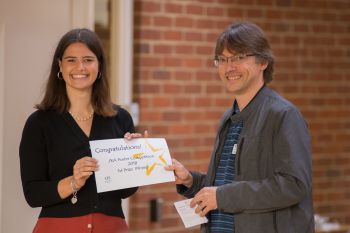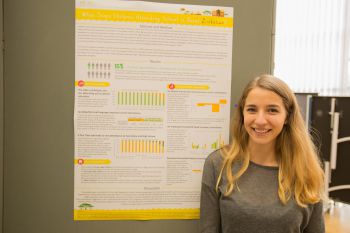Taking it to the House: University of Sussex students explain their research at Westminster
By:
Last updated: Wednesday, 6 March 2019

Art History student Louisa Hunt receiving the 1st prize for her JRA poster from Prof Seb Oliver.

Economics student Nicola Barker with her JRA poster.
University of Sussex students will tell MPs, senior officials and journalists how impoverished Zimbabwean pupils could be encouraged to stay in school and what a 16th-century linen shirt says about gender roles at a prestigious event in Parliament this week.
Art History student Louisa Hunt and Economics student Nicola Barker have been selected to represent the University at the national Posters in Parliament event, having impressed with their Junior Research Associate projects.
It is the sixth year in a row that the University of Sussex has entered students into the national competition but this time it will be extra special as the University has been granted the honour of organising this year’s event, which takes place on Thursday 7 March 2019.
Over 60 students from across the UK will present their research to parliamentarians and policymakers during the event in Westminster. Up to 20 MPs and members of the Lords are expected to attend, including four from Sussex constituencies.
Adam Tickell, University of Sussex Vice-Chancellor, said: “This event is one of the very best opportunities for Parliamentarians and policy makers to experience the extraordinary talents being nurtured on campuses nationwide.
"At the University of Sussex, we believe that every student should have the opportunity to develop their knowledge, skills and competencies through actively engaging with the pressing research questions and challenges of our time. That is why our undergraduate research programme is one of the biggest in the country.”
Louisa, who will be presenting her research on understanding masculinity through domestic clothes making in Renaissance Italy, said: “It's an incredibly exciting opportunity that I feel very grateful to be a part of. I feel proud to be able to represent the University and Art History in this way but it is also slightly overwhelming and very surreal to have the opportunity to potentially share my project with MPs and VIPs in Westminster."
She will be joined at the event by fellow University of Sussex student Nicola, who will be presenting her research on what prevents children attending school in rural Zimbabwe.
Louisa and Nicola both took part in Sussex’s Junior Research Associate (JRA) scheme, which gives undergraduate students the opportunity to gain real-world research experience in their chosen field. They were chosen to represent Sussex at the annual Posters in Parliament exhibition, having been judged the top two research posters during the University’s own Undergraduate Research Poster Exhibition.
Universities and Science Minister Chris Skidmore said: “We are a nation of innovators and researchers, and the event in Parliament highlights that this runs through all generations and these students are thinking outside the box and addressing many unknowns. The government is committed to seeing research and innovation flourish, and through the modern Industrial Strategy we have committed to raising R&D spend to 2.4% of GDP by 2027.”
At the Posters in Parliament event, a judging panel will be assessing the work of students from universities across the UK and eventually select students judged to have presented the best research posters.
The event is being held in association with the British Conference of Undergraduate Research (BCUR), an open coalition of universities dedicated to encouraging a national culture of undergraduate research.
Also attending will be informatics research student Daniel Hajas, who represented the University of Sussex at the 2016 Posters in Parliament, where he discussed a system he was developing to convert visual images into touch, sound and verbal feedback to improve the accessibility of STEM education for visually impaired students.
Daniel, who is blind, said of the experience: “Posters in Parliament was the first event where I really understood the power of posters. All I had was a black sheet, with a tactile question mark embossed on it. During the start of my talk, I told my audience all about these diagrams, equations, explanations which were all imagined. The majority probably just thought ‘what is he talking about?’. After a while, I told them what they experienced is similar to what a blind student would experience in a science class.
“Teachers often talk about diagrams, equations being ‘here’ and ‘there’, which means students are often left with many questions at the end because of the lack of visuals. The poster, and mini experience I created, conveyed this notion much better than I expected, and we had great discussions on my research topic with the guests.”
Other former participants at past Posters in Parliament events have also been recalling the positive experiences they had at the event and how it helped them to develop their academic work.
Rhys Sandow, who took part in Posters in Parliament in 2015 and is now a Doctoral Tutor and PhD Candidate in English Language and Linguistics at the University of Sussex, said: “The event gave me the confidence in my research that I was not limited to my course, my school, or the University, but that I could aim much higher. Presenting in the Palace of Westminster gave it that extra bit of gravitas.
"I don’t doubt that having this event on my CV went some way to securing my PhD funding. I believe that both the JRA scheme and the Posters in Parliament event provided the platform for my research and presenting skills that have served me well at leading national and international conferences throughout my PhD.”
Robert Tempelaar, a Sussex participant in 2017 and now a PhD Researcher at the University of Edinburgh, said: “I loved the Posters in Parliament experience. Representing Sussex was an honour and with all the other universities that attended, it I made me realise that the distance and differences between universities are actually very small.
"Being in Westminster and meeting some politicians, including the great Caroline Lucas, made me think about science in the wider societal and political scheme. As well as being an inspiring and rewarding day, it was also great to meet so many people one usually doesn’t get to interact with much including politicians and students and researcher from other universities.
"Having gone on to do a MSc and now PhD at the University of Edinburgh, I believe having Posters in Parliament on my CV added a much needed competitive advantage in a competitive field.”
Vasilii Kokorev, a Posters in Parliament contestant last year and now based at the Cosmic Dawn Centre, University of Copenhagen, said: “One of the most important things for me as a foreign student was the fact that I was given this wonderful opportunity to represent my university on the Parliamentary level. Outreach is important for science, be it for attracting more sponsors to fund your research or simply to see people’s eyes light up with interest when you talk to them about your work.
“At the poster exhibition I have managed to talk to a bunch of people from different fields, which has given me a deeper understanding of how research is being conducted outside of my field of astronomy.
“Presenting a poster and answering questions about my work also helped me to be more confident in myself and what I do, and is a good addition to my CV. I would definitely recommend all young researchers to try and participate. Sometimes we can all get too bogged down in our work but it’s important not to forget that the general public are a very curious lot and they want to know what goes on at the forefront of science.”
In addition to Sussex students having the opportunity to present work at the Posters in Parliament event, the University is supporting 15 Sussex and Brighton and Sussex Medical School students to attend this year’s annual BCUR conference at the University of South Wales between 15 and 16 April.
Sussex undergraduates who are interested in taking part in this year’s Junior Research Associate programme can find out more here.

